1. Results compared to the application and centre plan
1.1 How does the vision of the centre, the work packages/ focus areas and activities fit together?
The Centre on Experiential Legal Learning (CELL), Faculty of Law, University of Oslo, aims to extend practice-oriented legal education in a digital age throughout Norway.[1] Through the CELL model of experiential learning and deep student participation, we seek as a SFU to: (1) enhance the quality of learning processes; (2) provide relevant skills to future lawyers; (3) facilitate student research and societal contributions; and (4) improve the student learning environment by moving from a performance to learning culture. The latter includes reducing grade pressure/stress, a competitive student culture, exam retakes and dropout rates, and distance between different study programmes.[2] In so doing, CELL aims to create the Future Lawyer: Graduates ready to manage and work together on new technological, ethical, and social challenges.
During 2021, CELL discussed and agreed internally upon a fifth and long-term goal: development of a culture for pedagogical reflection and development and amongst staff, a community of practice. It was included as an activity in the SFU centre plan but CELL now sees transformation of teaching culture as a goal itself.[3]
Table 1. SFU Work packages and projects
| WP1. Skills ladder |
WP2. Digitalisation & Innovation |
WP3. Practice & Skills |
WP4. Legal pedagogy |
WP5. Communication & Broader Impact |
|---|---|---|---|---|
| 1.1 Planning and evaluation | 2.1 Online education |
3.1 Writing Lab |
4.1 Evaluation & Learning Analytics | 5.1 CELL Norway |
| 1.2 Implementation | 2.2 Digital Courtroom | 3.2 Clinical initiatives | 4.2 Pedagogical research | 5.2 Criminology and Sociology of Law pedagogical development |
| 1.3 Student as researcher | 2.3 LILO - Innovation Lab | 3.3 Centre for mooting | 4.3 Competence building | 5.3 International programmes |
| 1.4 Student as communicator | 2.4 Legislation Lab | 3.4 Forum for dispute resolution | 4.4 Learning assistants | 5.4 Communication |
| 4.5 Learning environment | ||||
| Goals 1, 2, 4 | Goals 2, 3 | Goals 2, 3 | Goals 1, 4 | Goals 1-4 |
As a Centre for Excellence in Education (SFU), CELL seeks to realise these goals through four core work packages: (1) implementing a skills ladder plan over the 5-year Master in Law through integration of experiential learning, especially in assessment; (2) developing online education and legal innovation; (3) strengthening students’ skills and practice opportunities through specific initiatives; and (4) developing legal pedagogy. While dissemination is built into the design of many of these activities, a fifth work package includes establishment of CELL Norway with the law faculties in Bergen and Tromsø, and pedagogical development at the faculty’s criminology/sociology of law and international programmes. CELL strives to be a European hub for experiential legal education and creating a ‘living model’ of an integrated experiential curriculum.
The relevant projects for each work package are set out in Table 1 and the relationship between the work packages and goals is detailed at the bottom of the table. Each project is relatively independent in its goals and organisation but there are significant synergies between them. Institutionally, the projects can be also classified as following: systemic development in cooperation with the faculty (WPs 1, 4), experimental development with labs and specific initiatives (WPs 2–3); and research and dissemination (WPs 4.1/4.2, 5).
The structure and activities of CELL are designed to support the implementation of these work packages. It is based on a staff-student partnership and a vision of students as co-producers of their education and future. The organisation is led by a leadership team - with a director, student co-director,[4] deputy director, centre manager, project coordinator and pedagogical advisor. It is assisted by a coordination team, which – after the 2021 organisational reform – is constituted by all academic and student project leaders, and others with considerable responsibility.[5] See annex 1 for an updated organisation structure. Since May 2020, a total of 43 individuals have worked at CELL (employed or bought out), although most in a part-time capacity. CELL’s leadership reports to the faculty leadership and the CELL Board on overall strategic direction. CELL has been further guided by its International Advisory Board and regular meetings with the Student Law Society.
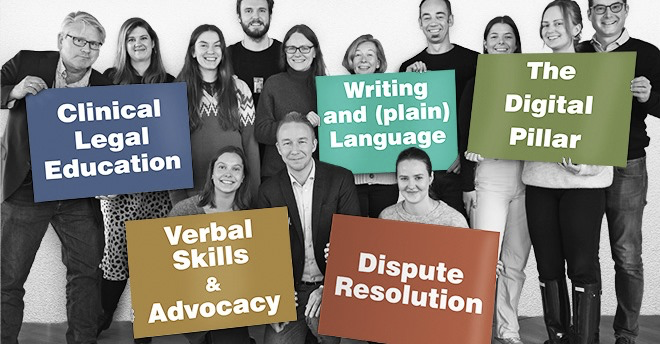
During 2020 and 2021, three important changes occurred in CELL’s working model. First, the tripartite model of faculty teachers, students, and administrative staff working together on an equal basis was expanded to a ‘quadripartite’ model. We seek now to include staff (and students) with a pedagogical education or background in each project activity. Our pedagogical expectations have also risen such that we seek to base each activity and outreach as much possible in broader research or our own research/surveys. Second, the organisation moved formally in May 2021 from an organisation based on the seminal pillars to SFU projects (see Table 1/Figure 1). This was done to better align activity with structure, facilitate interdisciplinary work, and create a more sustainable workload for academic staff. Third, CELL participated in several successful research and education funding applications, as both partner and leader, and CELL staff have been asked to play specific roles in national/university initiatives. This has enhanced or expanded the nature of some SFU projects.
1.2 Accomplishments and activities, expected results and impact, and goal contributions
The level of activity at CELL has been relatively high with several key accomplishments. This is despite being in a start-up phase and working considerably with online education development (WP 2.1) during the pandemic. The pandemic enabled initially CELL to reach some goals quickly and establish itself as a local and national actor, but it also led to the postponement of several important activities. The key challenge has been ensuring that the organization has the capacity to match goals and support activity.
The activities and impact for each WP is listed and discussed in separate sub-sections below; and the timetable and concrete progress for implementation is set out in Espresso. Some of the highlights of CELL’s first 19 months as an SFU include:
- Online education: Embedding our local and national work on online education in the centre and faculty. As an SFU, this has included hosting 8 webinars, presenting at 18 conferences/workshops, co-facilitating a faculty strategy on online education, initiating frontrunner groups on home exams and flipped classroom, and engaging in regular media communication to influence sectoral policy.
- Skills ladder: Developing and piloting concrete plans with course coordinators for four new experiential modules/courses, releasing part 1 of the skills ladder report, and piloting students as researchers.
- Evaluation and research: Releasing 6 evaluation reports (with over 3000 student responses), publishing our first academic article, conducting a survey review of experiential legal education literature, employing two Ph.D. fellows, and gaining national/university recognition for learning analytics expertise.
- Digitalisation and innovation: Establishing an innovation lab, developing a protype for the digital courtroom, expanding the LovLab legislation initiative, and supporting law students to secure innovation funding.
- Scaling up practice: Launching several practice initiatives, including facilitating a practice course for criminology students and obtaining funding from the RCN for a new student clinic on ID rights.
- Competence building and learning assistants: Providing online pedagogical resources for student writing assistants, coordinating the selection of over 129 writing/teaching assistants, improving the quality of 1st semester student colloquia, and expanding colloquia support to other semesters.
- CELL Norway: Establishing CELL Norway and developing a joint proposal on elective subject coordination, and assisting University of Bergen with its successful application for HK-dir funding.
- Student partnership: Facilitating an active student team which has piloted of a new model of co-leadership, developed the organisation, planned/implemented projects, and engaged in broad outreach. CELL students are called upon regularly to present externally.
At the same time, we have developed CELL as an organization, with a focus on internal policies, management and recruiting, and development of an internal and faculty culture for pedagogical innovation and student participation. This is slow and challenging work, and there have also been growing pains as we have sought to find the right fora and means for collaboration with the faculty and the student law society, develop internal routines and working cultures, manage budgets, and secure physical space.
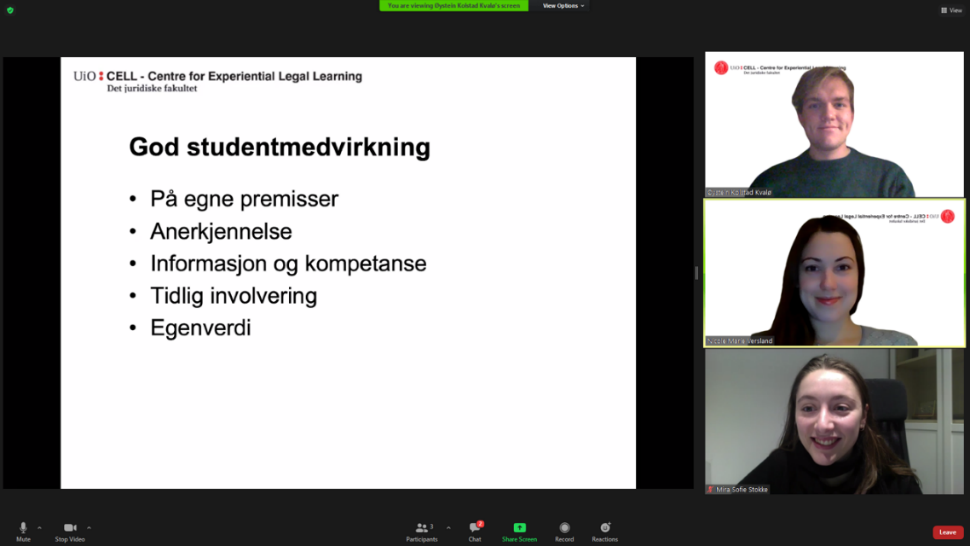
A key plank in CELL’s philosophy and practice is the inclusion of students in educational reform leadership. They co-lead and support/drive projects, improve contacts with student bodies, participate critically and constructively in strategic/organisational development, and disseminate findings. CELLs Student Co-Director represents the organisation in several forums, including the university's Pedagogical Innovation Network (PIN), which is otherwise constituted by the leaders of SFUs and HK-Dir Active Learning projects. He now leads PIN’s coordination group. Student project leaders have led parallel sessions at the annual University of Oslo education and SFU conferences, and participated in HK-dirs podcast on student partnership.
Student leaders have analysed critically the CELL model and presented this in different fora. The positives include early inclusion in CELL’s founding, paid positions, a positive culture towards student participation/leadership, and trust in students’ ability to lead, represent and undertake important tasks. Challenges include underlying power asymmetry, greater time commitments of staff, non-election by their student peers, and the more regular changes in student positions. In 2021, CELL made several changes after feedback, including clearer delineation of roles, competence building, and greater focus on working environment.
Moreover, the model of change envisaged by CELL is complex, but potentially transformatory. It envisages both direct change (planned impact) and indirect change (inspiration, cultural change). This multivalent approach is reflected in mechanisms for change, which include incentives (resources, reputation), discourse and dialogue (reshaping the consensus on what is good legal education), and legitimation (involving staff, students, and partners). This provides energy, originality, and acceptance and has a ripple effect as those involved become new ambassadors and agents of change. Finally, with a new fifth goal, the organisation has also begun to reflect on CELL’s endgame – the ultimate development of a community of practice. If academic teachers become more agentic, dialogue-seeking, and oriented towards pedagogical research, then pedagogical centres such as CELL can become less change-driven and more facilitation-focused.
Work package 1 – Skills Ladder
| Projects | Activities & Accomplishments | Expected Impact | Relevant Goals |
|---|---|---|---|
| 1.1 Planning and evaluation |
Permanent planning & evaluation group Baseline report for success from evaluations Part 1 of the Report – Learning Outcomes Part 2 of the Report – Assessment (in progress) |
Lay the basis for Project 1.2. | 1-4 |
| 1.2 Implementation |
Revision of Negotiations module in Contract Law (3rd year) Roll-out of group presentation in Legal History Video for simulated board meeting for company law New course on Judgment Analysis and Writing Evaluation of Programming for Lawyers |
Improve theory learning Improve skills Improve learning environment Decrease dropout rate, competition, and grade pressure |
1-4 |
| 1.3 Student as researcher |
Pilot project with SODI ID rights research project and students in all key roles 1-day open seminar on empirical legal methods Development of plan for progressive introduction of academic skills |
Improve theory learning Improve skills Improve learning environment |
1-3 |
| 1.4 Student as communicator | Student podcast project: student-led development and release of four podcasts | Improve range of skills | 2 |
The cornerstone in the SFU plan is the development of a ‘skills ladder’ through the 5-year Master of Laws. Figure 1 contains the original 2019 plan, with compulsory experiential module in each semester to develop four relevant skills and improve learning outcomes and environment. This plan has been updated, with “Advocacy and Negotiation” divided into “Oral and Mooting” and “Dispute Resolution” and the addition of two new ladders on “academic skills” and “cooperation and collaboration skills” (see projects 1.3/4.2).
Project 1.1 Planning and evaluation of the skills ladder was commenced with the support of HK-Dirs’s Student Active Learning grant. With this, CELL undertook preliminary mapping, established a cross-faculty working group to develop a detailed plan, and introduced a new module on negotiations in 5th semester and the elective subject programming for lawyers in 9th semester. As an SFU, this working group has become a permanent planning and evaluation group. In addition, we have established baselines for designing and measuring the impact of the skills ladder project, with questions included in student surveys. They show low student satisfaction with skill development, notably oral skills, but also legal and digital skills.
In June 2021 the working group released Part I of its report, which analysed and compared learning outcomes. It found that the overall learning outcomes needed only minor changes, but that they were poorly reflected in individual courses – and there was a clear lack of progression over time in skills/competence development. Recommendations include ensuring learning outcomes followed Bloom’s taxonomy over time, and Part 2 of the report will focus on new experiential modules and specific skills/competences.
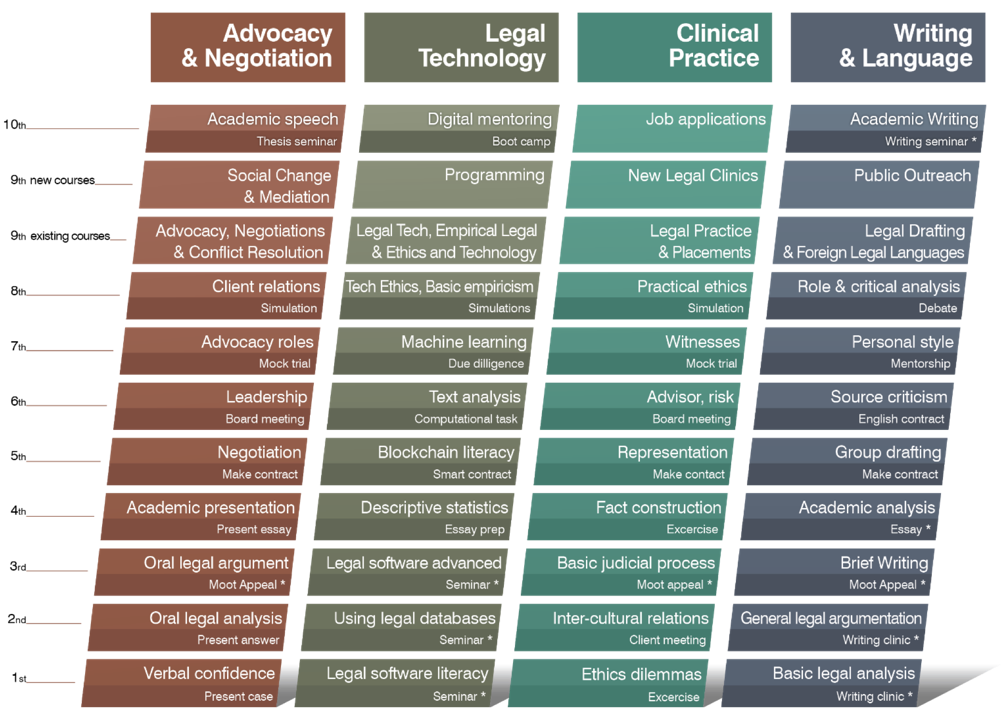
Project 1.2 Implementation of the skills ladder concerns introduction of new modules and subjects, and the creation of a dynamic innovation and learning cycle with reforms. As an SFU, we helped course coordinators for Legal History in 3rd year develop a group oral presentation and Company & Insolvency Law plan a board meeting simulation. The module in Legal History was introduced in Autumn 2021 and has received very positive student evaluations. The quality assurance of each student presentation by academic seminar teachers in advance led to high participation by other students.
Click here to watch the CELL Video on the Skills Ladder
Project 1.3 Student as researcher was introduced in 2021 to focus on the development of academic skills. This form of experiential learning was viewed as important for all students in work life, as well as those contemplating a research career. The initial pilot involved students co-leading and driving forward a work package in a RCN project on ID-theft, complemented by a 1-day open seminar. The project team are now developing, with Bloom’s taxonomy, a plan for progressive introduction of academic skills. This includes article-based master theses, a legal research course, and better integration of academic skills in obligatory subjects.
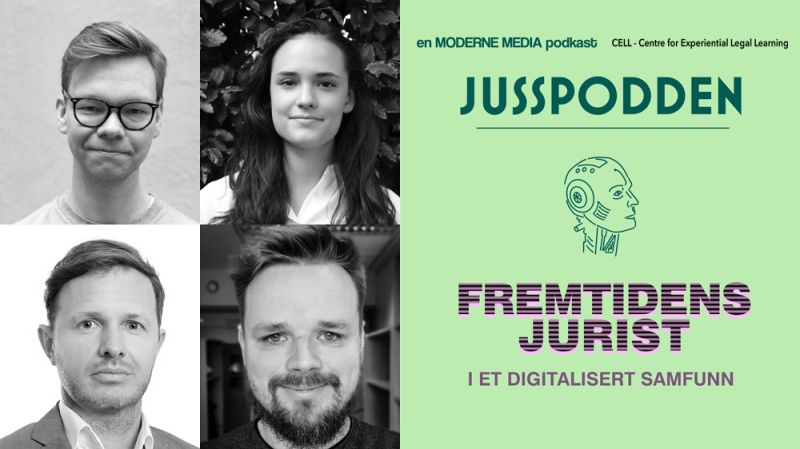
Project 1.4 Student as communicator was piloted in 2021. It includes some activities included in the SFU centre plan (e.g., Student as change course). In 2021, its student leader piloted a podcast series with the student-run Jusspodden on the future lawyer, in which academic, practitioner and student experts spoke about the rise of legal technology. It has led to a proposal by student leaders for a new podcast series for students.
Work package 2 – Digital Learning
| Projects | Activities & Accomplishments | Expected Impact | Relevant Goals |
|---|---|---|---|
| 2.1 Online education |
8 webinars on good online teaching and assessment 18 conference and workshop presentations Co-development of faculty’s online education strategy Hosting of national Facebook group on Digital Education (4520 members) Frontrunner groups on home exam/flipped classroom Pilots of hybrid learning and teaching Awarding of student parliament prize to CELL Director |
Improve quality of digital education Increase opportunities for interactive learning Decrease pressure on teachers/students |
1, 2, 4 |
| 2.2 Digital courtroom |
Development of a prototype and securing of extra university funds Pilot digital mock trial in Zoom with ICJ Norway and Maritime Law students Development of Justbot digital application with Tech-R (taken forward by Tech-R) Testing automated feedback applications Consultancy for Norwegian Court Administration on digital courtrooms in Croatia Student project for SAKULATOR RCN project with machine learning/design |
Provide new digital learning tools Create future work tools for law students Increase focus on EdTech and learning analytics within legal education |
2, 3 |
| 2.3 LILO – Innovation Lab |
Establishment of lab, project team, and leadership Inclusion of several external partners Student-focused activities to inspire innovation Establishment of support routines for student projects. Two student projects received 1 million NOK each from RCN Co-hosting of Meetup series with Lexolve for legal tech community in Norway Responsibility for boot camps in Legal Tech course and establishment of Programming for Lawyers course |
Opportunities for student innovation Support students with innovation Meeting space for students, staff, and partners |
2, 3, 4 |
| 2.4 Lovlab Legislation Clinic |
Two semesters of student-driven law reform reports Inclusion of non-law and Bergen students Experimenting with teaching assistants and support to student public outreach Development of legislative guidelines Evaluation and marketing |
Increase opportunities for clinical practice Allow students to make societal contributions |
2, 3, 4 |
The pandemic meant that the online education project (2.1) in CELL’s digital learning work package received outsized attention. CELL’s high-profile role on this topic – locally and nationally – meant high demand for competence building, strategic development, and pedagogical, political, and media engagement. The student team also continued to produce and communicate for law students, especially at the CELL student webpages Support was also given to students in the Master in e-Government to make videos for courses. In 2021, we introduced front runner groups for staff on flipped classrooms and home exams, which also led to deeper discussions on new experiential assessment forms for the skills ladder.
After delays in recruitment, the Digital Courtroom Project 2.2 has now developed a prototype. Further funding was secured from the university to make the project sustainable and to ensure its integration in Canvas. Moreover, students in the legal tech course developed a machine learning algorithm and a front-end design for judges for the side project, SAKULATOR, on case processing times (financed by the RCN and in partnership with the Norwegian Courts Administration, NORCE, and University of Bergen).
Project 2.3 Legal Innovation Lab in Oslo (LILO) has held a series of public meetings and student consultations. In 2021, two student projects supported by LILO received 1 million NOK each from the RCN to develop and commercialise prototypes on GDPR analysis of website cookies and access to citizen’s personal data. LILO has created a mentoring support structure for students, co-hosts a boot camp on legal technology, legal hackathon, and the Legal Tech Meetups.
Project 2.4 Lovlab Legislation Clinic was originally piloted with support from HK-dir Active Learning and Plain Language projects. Students write comprehensive law reform reports after mandates given by government and private actors. It has moved beyond being an elective course and is now a distinct CELL project. CELL has marketed and evaluated LovLab and supported the inclusion of teaching assistants and students in publicly communicating their findings. Students from the criminology programme and University of Bergen have now been included and Lovlab has supported some government departments in developing specific guidelines for legislation.
Work package 3 – Practice and Skills
| Projects | Activities & Accomplishments | Expected Impact | Relevant Goals |
|---|---|---|---|
| 3.1 Writing Lab |
Reform of recruitment process to ensure committed assistants New strategy for student writing assistants Detailed plan for launching Writing Lab in 2022 Development of online learning resources for assistants National writing seminars for students with Plain Language project Meeting on automated feedback technologies |
Improve quality of feedback & learning culture Gradual expansion and quality assurance |
2, 3, 4 |
| 3.2 Practice initiative |
Evaluation of recruitment sustainability of student clinics. Agreement with Insj on investigating practice places, quality assurance, and competence building. Successful SODI application to RCN on ID-theft with new clinic and empirical research - now in 1.3 |
Increased opportunities for practice Improved quality through evaluation |
2, 3, 4 |
| 3.3 Mooting Initiative (possibly centre) |
Preparation of report and global survey Piloting of a voluntary moot in 2nd semester Support with participation in the Telders Moot and prestigious Jessup moot: first Norwegian team in 20 years Development of plan for research on oral skills |
Increase opportunities for learning oral and advocacy skills | 2, 4 |
| 3.4 Negotiation Forum |
Establishment of Forum for Dispute Resolution Evaluation of Negotiations course in a digital environment Communication of new book on smart negotiation Development of cases for obligatory course Support to work in 3rd year on negotiation and boardroom modules |
Increase opportunities for learning dispute resolution skills Increase quality of existing courses |
2, 4 |
The implementation of the four skills-based initiatives in work package 3 was partly delayed due to the pandemic and lockdown. In Project 3.1 Writing Lab, CELL took over recruitment of student writing assistants to increase focus on pedagogical competence and student learning environment, which was complemented by development of a strategy document and a website for assistants. Based on a detailed plan, the writing lab will be piloted in Spring 2022 with an initial focus on the first three semesters in the Master of Law.
In Project 3.2 Practice Initiatives, significant work was carried out in evaluating existing clinical initiatives, signing an agreement with Insj to investigate the scaling up of student legal information services on entrepreneurship law, and the successful application to the RCN for funding of an ID-lawyer student clinic. In Project 3.3 Mooting, the focus has been on planning for an eventual mooting initiative, with report analysing pedagogical literature and models in other countries/universities. Pilots have also been conducted with support to students in the Jessup moot, and the Education Dean (2020-2021) trialled a new mooting exercise in 2nd semester, with some support from the Jessup students. In Project 3.4, a staff-student Forum for Dispute Resolution was established by CELL which has focused on development within courses and increasingly connecting students to external partners.
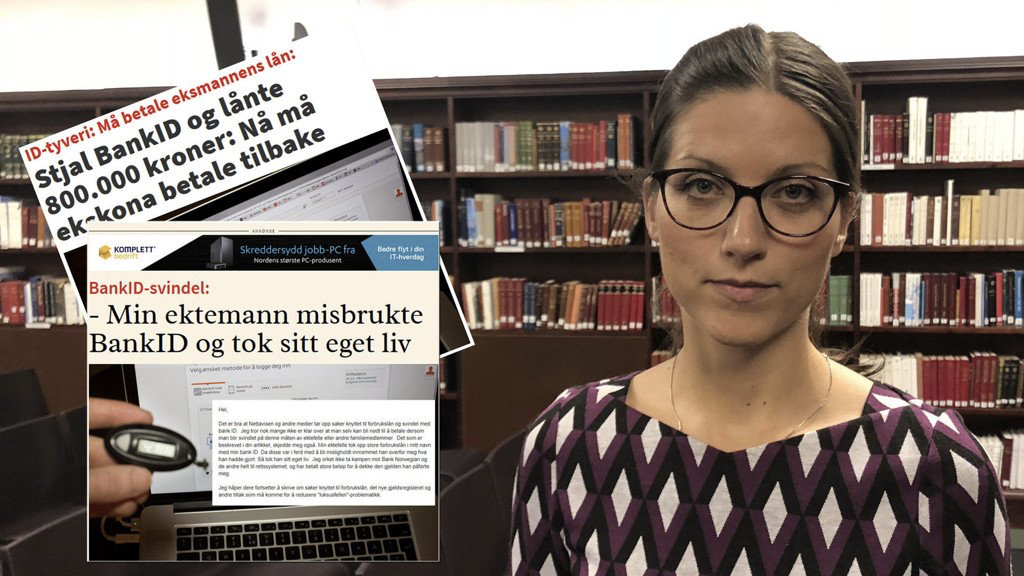
Work package 4 – Legal Pedagogy
| Projects | Accomplishments | Expected Impact | Relevant Goals |
|---|---|---|---|
| 4.1 Evaluation & Learning Analytics |
Seven published evaluation reports Wide dissemination on home exam reports and semester evaluation reports Partnership and leadership in HuLAR learning analytics project at University of Oslo Pilot project on GDPR and learning analytics with legal analysis Leadership of University working group on guidelines for learning analytics Participation as member in national expert group on learning analytics |
Influence teaching & admin Influence teaching & admin & WP1 Baselines for WP1, 3 and CELL as SFU Influence teaching & admin Develop basis for learning analytics |
1, 2, 4 |
| 4.2 Research |
Publication of academic article on Online Teaching and Teacher Agency in 'Computers in Human Behaviour' Analysis of data on law students from University of Oslo survey on living conditions and study progression during the pandemic Report and database on scholarly literature on experiential legal learning Drafting of article on home exams Employment of a Ph.D. to research assessment forms in experiential legal learning Joint employment of a Ph.D. with education faculty and SHE SFU in medicine Successful TeamLearn application to the RCN Employment of a leader for this project from 2022 through education faculty. |
Develop research front on online education Develop research front on experiential learning Develop basis for ML algorithms in legal pedtech Influence WP1 and 3.3 - oral skills Influence all WPs through better research Strengthen WPs 1 and 3 with research base + dissemination Develop research front & influence policy |
1, 2, 4 |
| 4.3 Competence building |
Holding a pedagogical session in the national course for legal Ph.D. fellows Revised competence building for student colloquium leaders Support to experimental elective subjects on good group work Agreement with faculty to develop a competence building strategy See also project 2.1 on online education; 3.1 on student writing assistants; and 4.4 on learning assistants |
Pilot competence building on experiential learning Support student leaning cultures Support student leaning cultures, group skills Integrate pedagogy in faculty and ability to reach SFU goals Increase quality of online education Increase quality of writing training |
1, 2, 4 |
| 4.4 Learning Assistants |
Evaluation of colloquia mentors Development of online learning resources for all learning assistants Coordination of use of emergency COVID-19 funds (1.3 million NOK) at the faculty – focus on colloquia groups post- 1st semester Piloting of learning assistants in extra electives |
Support the expanded and better use of student learning assistants | 1, 2, 4 |
| 4.5 Learning Environment |
Participant observation of the 2-day retreat for new Maths and Natural Sciences students Dialogue with the Student Law Society on concrete steps to reduce competitive pressure Dialogue with 1st year academic coordinator on measures for new students Creation of a working group on learning environment initiatives |
Implement targeted measures to improve the psycho-social learning environment, especially around grade pressure and competition culture. | 4 |
The COVID-19 pandemic partly accelerated activities in WP4, although it delayed recruitment and concentrated initially the focus on online learning. In Project 4.1 Evaluation and Learning Analytics, three rapid-fire evaluations of pandemic teaching resulted in the creation of a new ‘evaluation infrastructure’. This work continued as a SFU, with six new evaluation reports, which were broadly communicated. The report on international students led to the Faculty agreeing to appoint a representative for all international students, and the reports on home exams to several teacher’s changing their strategy.
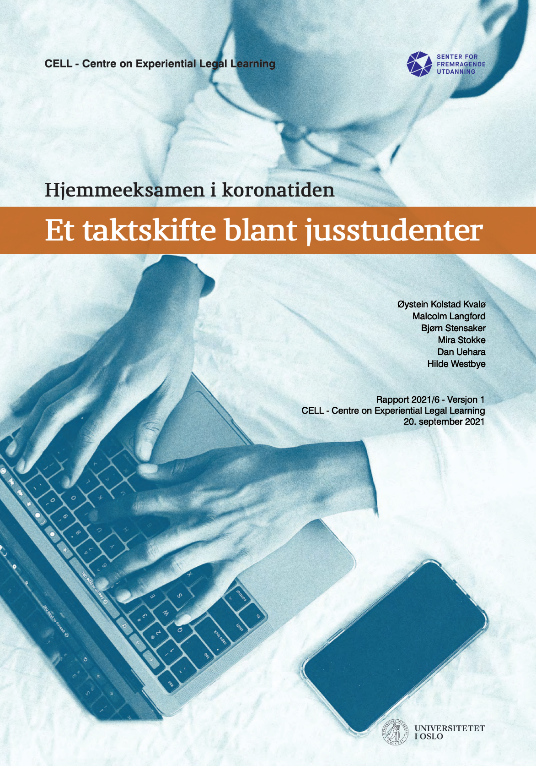
This survey-based evaluation work is complemented by medium-term work on integrating learning analytics in digital learning platforms (2.2) and evaluation and feedback systems (3.1). CELL is represented in the leadership group for the University’s Hub for Learning Analytics (HuLAR) and in 2021 helped prepared a report with the IT department’s lawyers addressing privacy law obstacles. This work led to CELL staff being appointed to lead and work on a university-wide group to develop guidelines to allow conditional use of learning analytics and sit on the new government-appointed national expert group on learning analytics.
Project 4.2 on pedagogical research has slowly begun to find its feet. Evaluation activities precipitated an early start. Using and analysing data with mixed methods from CELL’s second evaluation in March 2020 (experiences of academic teacher’s in Norway), two CELL staff and an associate published the article ‘Teacher Agency and Online Education in Times of Crisis’ in the pedagogy and technology journal Computers in Human Behaviour. The article has also impacted CELL’s understanding of its mission with a growing focus on providing space for teacher development rather than simply support. Time was also used to plan research for 2021 (including on oral skills, experiential learning, educational transformation), recruit Ph.D. fellows, and identify a leader for CELLs pedagogical research work.
CELL’s Project 4.3 competence building activity in Autumn 2020 also moved beyond online education with support for experimental elective subjects (LovLab and Robot Regulation) on good group work and collaboration. In addition, plans were developed for the first pedagogical element in a national Ph.D. law course and support for colloquium student leaders in first year. In 2022, CELL will develop a full competence building strategy with a focus on a course for new staff and support for implementing the skills ladder.
Project 4.4 Learning Assistants has been one of the most successful projects in terms of reported learning outcomes. A collaboration was established with the academic coordinator for the colloquia groups in 1st semester and a series of dialogues on pedagogical development were held. This led to the employment of a student mentor, evaluation of the colloquia programme, development of formal learning outcomes, and creation of online resources for colloquia leaders - with a focus on ensuring colloquia become self-sufficient. CELL received strong positive feedback and colloquia groups receive the highest satisfaction ratings from students amongst all learning forms. In early Spring 2021, the Student Law Society asked CELL to help with supporting students in 2nd semester onwards with maintaining or starting colloquia. With the release of government emergency funds, CELL mobilised to support and administrate successfully a roll-out of this idea.
Project 4.5 Learning Environment is being trialled as a project by CELL’s Student Co-Director with a focus on students’ psychosocial learning environment. Already the subject of goal 4, the COVID-19 pandemic restrictions revealed the challenges of an environment characterised by individualism and high competition and grade pressure. A new CELL-led working group is preparing a full strategy and CELL’s deputy leader and the new Education Dean have already sought to make some concrete changes in first year.
Work package 5 Management and Communication
| Projects | Activities and Accomplishments | Expected Impact | Relevant Goals |
|---|---|---|---|
| 5.1 CELL Norway |
Agreement signed between Oslo, Bergen & Tromsø Regular leadership group meeting in 2021 Four webinars on COVID-19 on online education Plan for cooperation on elective subjects |
Disseminate results Mutual learning Jointly improve education |
1, 2, 3, 4 (indirect) |
|
5.2 Criminology and Sociology of Law |
Discussions on strategy Support to criminology institute to apply for work relevance funding Support to design new practice course in criminology and evaluation it Inclusion of criminology students in LovLab and Student as researcher project |
Provide criminology students with practice Improve range of skills |
2, 3, 4 |
| 5.3 International programmes pedagogical development |
Discussions on gradual expansion of Human Rights in Practice Course Support to comprehensive pilot student advocacy initiatives in Human Rights Practice to support Scholars at Risk Plan for experiential methods course in human rights masters Discussions on need to ensure new students in international programmes can match skills of Norwegian bachelor students (see project 1.1). |
Improve theory learning Improve range of skills Improve learning environment |
1, 2, 3, 4 (initial focus on 1, 2, 4) |
| 5.4 Communication | See section 2 below | 1, 2, 3, 4 |
In December 2020, the law faculties of Oslo, Bergen and Tromsø signed an agreement for a national platform, Project 5.1 CELL Norway, for collaboration on experiential legal learning and cooperation on educational reform. The work program was developed during 2021 and initial focus was on: (1) coordinating better elective courses; (2) sharing lessons learned from educational experiments/evaluations; (3) hosting online seminars and (4) ensuring better contact between staff and students from the different universities. CELL Norway’s leadership group includes the education dean and a student representative from each faculty together with the CELL director and centre manager. The mapping and development of a concrete proposal on elective subjects has helped define working methods in CELL Norway.
Project 5.2 Criminology and sociology of law programme pedagogical development has created space for a medium-term dialogue on more ambitious reforms within these study programmes. A good working relationship has already been established after support to and evaluation of the development of a practice course and support to different interactive learning initiatives. Staff and students from criminology have also been integrated in some other initiatives (e.g., 1.3).
Project 5.3 International programmes pedagogical development seeks to embed the planned transfer/dissemination of lessons on the skills ladder to the four international master programmes. Course coordinators for these programmes have identified the need to ensure that their external students develop quickly the expected skills and learning approaches the Faculty has for its Norwegian law students. CELL has begun working with the human rights master and provides support for many of the elective subjects that fall within these courses.
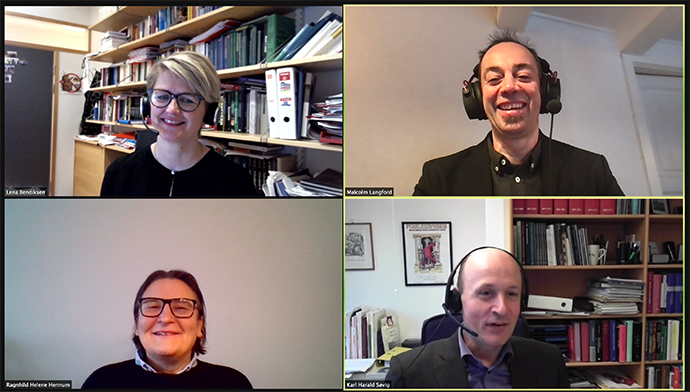
2. Dissemination of knowledge and practices
How has the centre worked with dissemination of knowledge and practices both within and outside of the institution? What is the expected impact of the dissemination activities?
CELL seeks to establish itself as a pedagogical hub for legal education in Norway and Europe, collaborate with leading pedagogical scholars and experiential legal educators around the world, and provide ultimately a ‘living model’ of experiential legal learning that can be a reference point for reforms elsewhere. Dissemination is integrated in almost every work package, such that it is part of project plans and organisational structure. In addition, we have a communication project that seeks to assist these effects. The dissemination plan presented to the SFU interview committee and included in the centre plan is set out below, and we report on results. It has been updated for new avenues for dissemination (those with a star *).
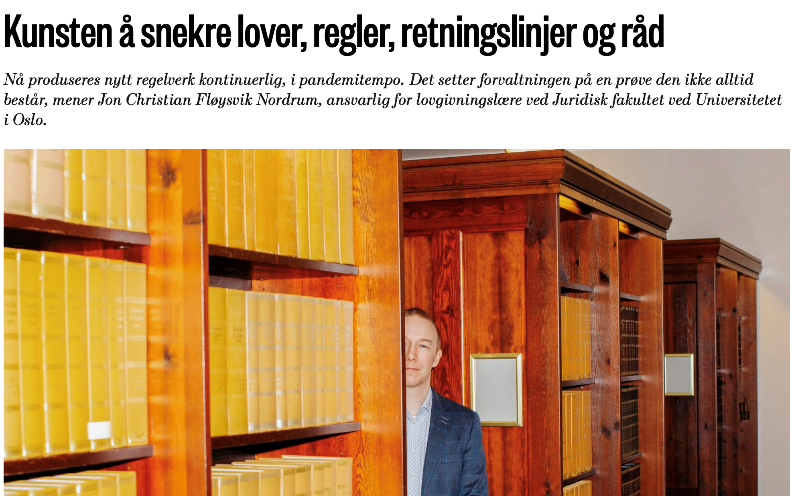
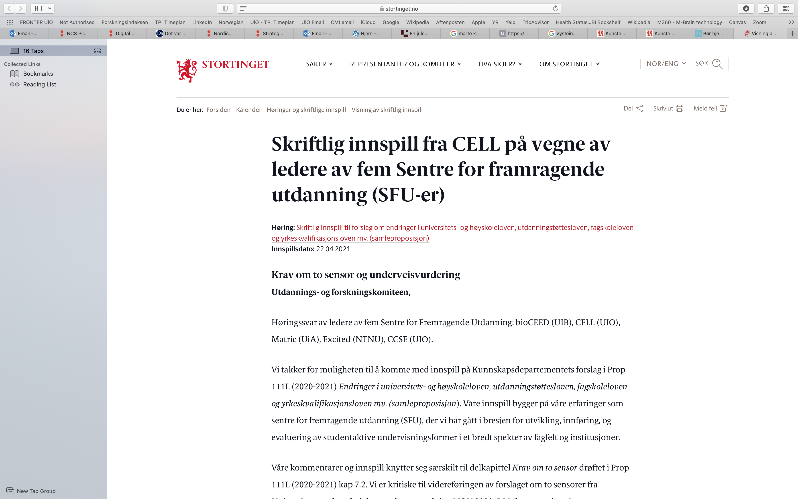
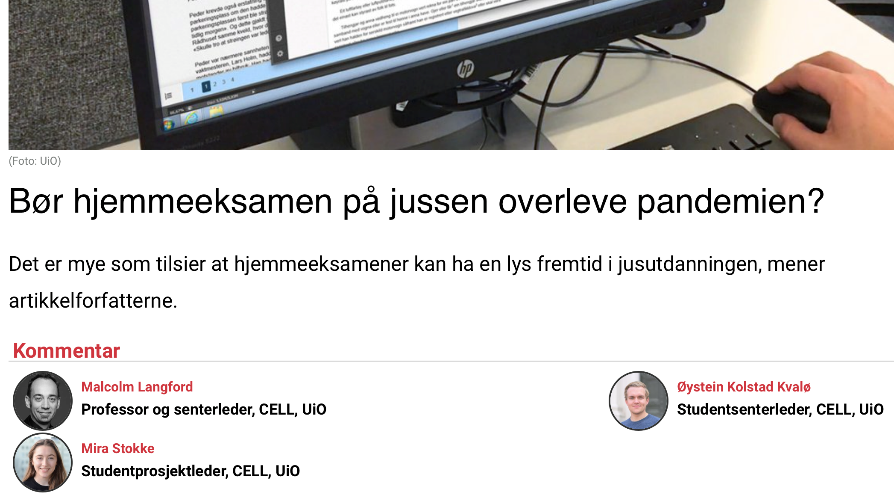
Dissemination plan and Implementation
| Dissem Activity | Plan |
Results in 2020, 2021 |
|---|---|---|
| I. Organisational design | ||
| 1. Centre leadership | Leadership includes all key institutes and programmes | Plan fulfilled. |
| 2. CELL Norway (also project 5.1) | National platform for coordination on experiential legal learning/pedagogical research | See project 5.1 above. |
| 3. Nordic Network | Biannual meeting timed with Nordic Deans + virtual network |
To be further implemented Webinar held with Orebro university in Sweden. |
| 4. European consortium on legal clinics | Through Jussbuss, CELL will disseminate work in this newly established network. | To be implemented |
| 5. International Advisory Board |
Use the board actively as ambassadors for dissemination |
Established and meetings held in Autumn 2020 and 2021. Led to some changes. |
| 6. Academy of Higher Education | To be founded with support from Academy of Science. Initial invited members: SFU leaders/‘merited’ teachers |
To be investigated from Autumn 2023 Proposal made to HK-dir to establish this as an SFU legacy project |
| II. Activities | ||
| 7. Annual Prizes | Annual international and Norwegian prize for CELL. | To be established in 2023 after a review |
| 8. Annual workshops, digital seminars | Assemble teachers, students, key actors, advisory board, leading educators | See activities in project 2.1 and 4.3. |
| 9. Doctoral research on legal education | Monograph/articles that examine the method and effect of activities | Two positions filled |
| 10. Teacher exchange programme | 1-2 week teaching visits by lecturers and student assistants to listen or help | To be implemented after COVID-19 |
| 11. CELL alumni initiative | CELL students and others in continuous legal education for lawyers | To be implemented |
| III. Dissemination tools | ||
| 12a. Website (and blogs*) | Publicity and documentation of activities and results |
New SFU website launched Development of student pages Write well series |
| 12b. Internal faculty and members* | Development of internal newsletters and engagement in spaces with academic teachers |
Regular newsletter Active participation in general and teacher group meetings (micro dissemination) |
| 12c. Invited presentations* | Present results to conferences and teacher seminars after invitation | Over 30 presentations on CELL’s work, online education, and student partnership |
| 13a. Mass media* | Use of national and university media to communicate | Over 30 interviews and Op. Eds as SFU in 2020/21; Over 60 as CELL. |
| 13b. Social media | Active use of Facebook/Instagram for CELL and Twitter for prizes. |
Growing use of Facebook and LinkedIn Fortnightly/monthly newsletters Manage national Facebook group on digital education – a digital community of practice but more passive in 2021 |
| 14. Legal education blog | Create an experiential legal learning blog with int’l partners | Under development |
| 15. Academic publishing | The first book on experiential legal learning plus evaluation articles |
First article published Other articles underway |
| 16. Legal Design & Entrepreneur Clinic | Participation of diverse students in design and implementation | Now projects 2.3 and 2.4. |
3. Further progress: What are the expectations for the coming year?
In light of the activities of 2021, is there a need for adjustments of the centre plan, the budget and/ or the dissemination strategy?
The 2020 report indicated five key areas where we intend to make changes to plans, budgets, and dissemination:
- Consolidation of secondary goals as a fourth primary goal on learning environment
- Restructuring of organisation form along work packages and projects
- Partial reallocation and refinement of projects
- Increase in involvement of pedagogical staff, which is reflected in the main budget change for 2021.
- Focus on creating a community of practice at the Faculty and CELL Norway faculties for pedagogical innovation and reflection with some external dissemination plans postponed until 2022 and onwards (e.g., 3, 4, 6, 10).
All of these changes were implemented in 2021 as detailed above. The major change for 2022 will be a stronger prioritisation of projects in terms of tempo, with a focus in 2022 on WP1 Skills ladder, WP3.1 Writing Lab, and Pedagogical Research (WP 4.2). The budget is likely to slightly favour greater funding of administrative and developer positions over buy-out of academic staff given experience on the best balance.
[1] CELL was created in June 2018 and formally launched by staff and students in November 2018 with the mission of ‘expanding, experimenting with, evaluating and disseminating new forms of experiential learning in law’.
[2] These learning environment-related goals were elevated from secondary goals to an overall fourth primary goal in 2020. It was recognised that learning environment was not only important for learning but was importnt in itself.
[3] A formal process for its inclusion as a goal has begun.
[4] The position moved from a 40 % position in 2020 to a 100 % position in 2021.
[5] The coordination team was originally the five academic and five student pillar leaders.
